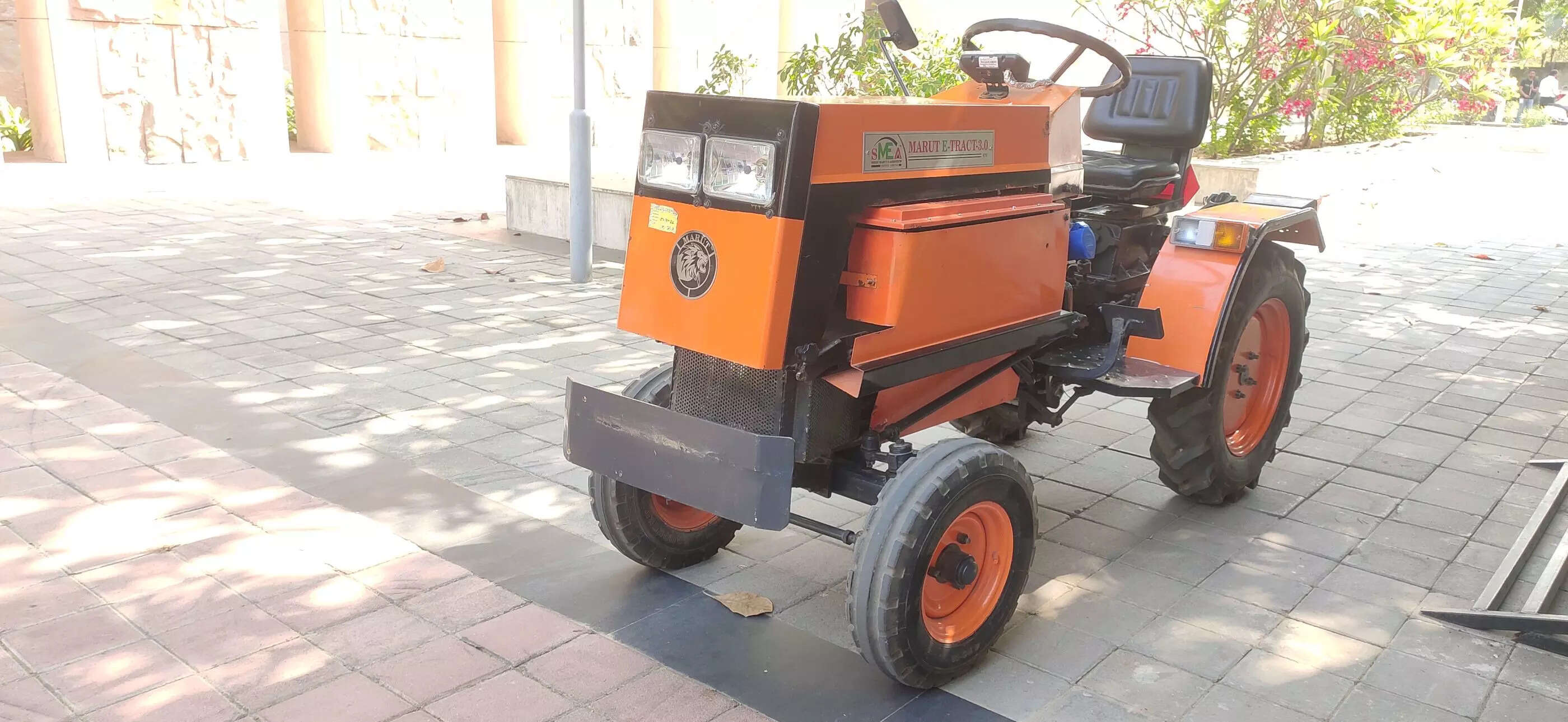
Tractors, normally, are developed by OEMs in their R&D hubs, with inputs from farmers. Marut E-Tract 3.0, a small electric tractor, is developed in the fields by a farmer-engineer, Nikunj Korat, and his brothers in Gujarat investing about INR 1 crore. Freshly certified by iCAT (International Centre for Automotive Technology), and with a target price of INR 5.5 lakh, the entrepreneur seeks funds for commercialisation ,investor support and also FAME subsidy.
Four years ago there was a wave of electric rickshaw launches in Delhi. That triggered a thought that if on-road vehicles can go electric, why can’t we think of going electric in farming,” Nikunj told ETAuto.
Marut E-Tract 3.0 claims to have a duty range of 6 to 8 hours in a single charge. According to Nikunj, it can be fully charged in 4 hours. As for the applications, “jo bhi applications ek chhota diesel tractor kar sakta hai, Marut E-Tract 3.0 bhi kar legi (The Marut E-Tract 3.0 is fit for all applications that a small diesel tractor is capable of.),” he said.
The challenges
While Nikunj has gained a good amount of inputs from farmers in his village to develop E-Tract 3.0, he may find it difficult to get a good number of customers to pay INR 5.5 lakh, the target price of his electric tractor. A small diesel tractor costs only around INR 2.5 lakh. The engineer-entrepreneur argues that while the acquisition cost will be higher, the running and maintenance cost over 15,000 hours of operations for the electric tractor can be 1/10th of an equivalent diesel tractor. The lithium-ion battery pack with LFP (Lithium Iron Phosphate) chemistry in the Marut E-Tract 3.0 is expected to have a life of 15,000 hours. Nikunj makes the calculation based on an estimate that a diesel tractor consumes nearly a litre of diesel an hour, and the electric tractor’s running cost is just INR 10 per hour.
Nikunj also pleads for the Indian Government’s FAME scheme to cover tractors too, considering that India has a large agricultural economy. If that happens, the subsidy an electric tractor like the Marut E-Tract 3.0 could qualify for will be around INR 1.5 lakh. “Agriculture ke liye to sarkar zyada subsidy deta hai, to electric tractors ko bhi baki EVs se zyada milna chahiye.(The Government provides more subsidies for the agricultural sector, so by that logic electric tractors should qualify for larger subsidies than other EV segments.), Nikunj said.
Born in the fields
As a member of a family of farmers in Junagadh, Gujarat, 28 year old Nikunj Korat had the options to join his father and uncle in the field, take up a job, or start a business. Influenced by the electrification megatrend, he decided to be an entrepreneur in the farm equipment sector. Nikunj, along with his brother and a cousin, has developed an electric tractor.
Marut E-Tract 3.0, is powered by an 11kWh battery pack and a 3kW motor. it isn’t the first electric tractor in India, but it could qualify as the first one to be conceptualised by a farmer-engineer, and largely developed in the fields. Nikunj, who occasionally helps his father and uncle in the fields, is also an electronics engineer. The initial project was a motorcycle mounted ploughing machine.
The small electric tractor from Shree Marut E-Agrotech, the startup floated by Nikunj and his brothers Mohitkumar and Chandulal, was developed to also meet a growing challenge. “Abhi agriculture land kam ho raha hai. Do cheez ho sakta hai – ya to tractor rent mein le sakte hain, nahin to chota tractor kharid sakte hai.” (Today, the challenge is that agricultural land holdings are decreasing. Two things can happen – either get a tractor on rent, or buy a mini tractor. That’s why the share of small tractors is growing in the market,” Nikunj said.
The segment of tractors below 25HP in India is pegged at 66,000 units, or 8% of the industry’s annual sales volume. Within that, 15-20HP tractors sold around 22,000 units or around 3% of the domestic tractor market during the last financial year.
According to Bhartendu Kapoor, Chairman, marketing committee, TMA (Tractor Manufacturers Association), the small tractor market is growing mainly due to good returns in horticulture crops, and good rainfall in some key tractor markets like Maharashtra, Gujarat, North Karnataka. Small tractors are also preferred for intercultural farming. When it comes to small electric tractors, the industry requirement is for a ‘minimum’ of 4 applications, and 8 hours of operations in a single charge.
For Nikunj and his team, the fields have been the place for R&D, testing, and validation. The startup founder said 25 transmission sets and 5 tractors were broken during the electric tractor’s development programme.
EVangelising technology and innovation
Marut E-Tract 3.0 is one of the entries at EVangelise 2022, the second edition of an annual EV innovation challenge hosted by iCreate (International Centre for Entrepreneurship and Technology), an Ahmedabad-based startup incubator supported by the State and Central Governments. iCreate says it received close to 1160 startup entries from 114 cities in 23 different states for EVangelise 2022, the finals of which will be held on December 19 and 20, 2022,
“There are multiple startups in different areas, and we are trying to sort of build an ecosystem where products are also interoperable or compatible with each other. For example, when you have a BMS (Battery Management System), and someone else is working on a battery, then automatically there’s an opportunity to make it compatible with each other,”Avinash Punekar, CEO, iCreate, said.
Around 40 entries made it to the ‘Bootcamp’ of the event. Marut E-Tract 3.0 stands out as the only EV for farm application. Around INR 1 crore has been spent on the project so far, Nikunj said. What he looks for now is a tie-up with an OEM, or funds from other investors, to commercialise his electric tractor.
Also Read:















